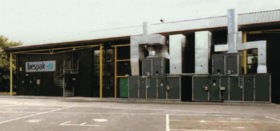Thermal-Transfer contract aids production of pharmaceutical devices

This external air-handling plant at Bespak at Kings Lynn is part of an £850 000 contract by Thermal Transfer for the production of pharmaceutical delivery systems.
Thermal Transfer has completed an £850 000 refurbishment contract to provide a state-of-the-art facility for manufacturing pharmaceutical delivery systems. Bespak designs, develops and makes specialist medical devices, including metered-dose inhalers, dry-powder devices, actuators and compliance aids. This contract involved designing and installing a controlled environment, electrical services to cleanroom standards and civil work for 500 m2 at Kings Lynn. The space has been divided into three areas. About half the ground-level space is divided by a wall the full height of the building to accommodate rubber-moulding presses. There is a raised deck in the machine section to accommodate the underfloor pipework, which terminates above ground at hubs for each machine. A false ceiling houses electrical services, inlet grilles and extract-air connections. Ductwork is supported in the ceiling void. The rest of the ground floor is given over to processing raw materials. There is an extruder and grinding mill, fed from an intermixing and loading point directly above on a mezzanine floor. Extraction hoods and ductwork remove fumes and take the return air to two external air-handling units. The AHUs supply space heating and cooling to all areas. A unitary dust collector and ductwork system extracts the larger particles from the intermixing and loading point.


